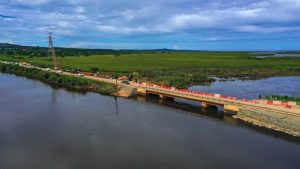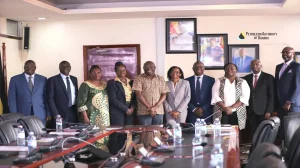Share
The Kampala Capital City Authority (KCCA) is building 45 cutting-edge facilities to solve Kampala City’s lack of public restrooms. Because the city’s public restrooms are inadequate, people are turning to the streets and green spaces as a place of refuge, which has prompted calls for more facilities from both the public and members of parliament.
The construction sites at Kiswa Market, Namuwongo Market, and City Square were subjected to a technical inspection by Dorothy Kisaka, the executive director of KCCA, on December 12, 2024. The project is to enhance sanitation and lessen the burden on current facilities. It is being carried out in cooperation with the Kampala-Lake Victoria Sanitation Project (K-LVWATSAN). The completed restrooms at the numerous schools and locations that were visited will shortly be open.
With the help of collaborators like Uganda Breweries Ltd (UBL) and Citywide Inclusive Sanitation (CWIS), these restrooms boast creative designs that include multi-story buildings with lower floors housing restrooms and bathrooms and higher floors housing establishments like cafeterias and restaurants. Kisaka highlighted the objective of providing sanitary facilities in order to help create a cleaner city.
These restrooms will be positioned strategically to serve the Central Business District, police barracks, marketplaces, and schools. In the CBD alone, over 20 restrooms are anticipated. The Sanitation for Millions initiative, which is part of KCCA’s efforts to improve sanitation in the city, entails building 45 inclusive, gender-friendly, and climate-resilient toilet positions in addition to 53 more toilets under the City-Wide Inclusive Sanitation (CWIS) program.
More than 3,500 homes have upgraded their toilets as a result of the KCCA-initiated Weyonje Subsidy initiative, which has improved the city’s faecal sludge management. These programs, which prioritize infrastructure, technology, and public health, come under the umbrella of smart cities. The main objective of KCCA is to develop a more sustainable and healthy urban environment.






